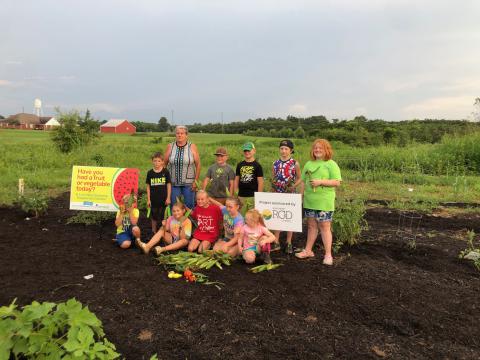SNAP-Ed Extension Agent Ginger Eatman is shown with students at a garden harvest at the Hackleburg High School and Hackleburg Elementary School garden. See column on page 4 and photo page on 12.
MARION COUNTY — Across Alabama and the nation, the Supplemental Nutrition Assistance Program–Education, known as SNAP-Ed, is making a difference—one healthy choice at a time.
Funded by the USDA, SNAP-Ed is designed to empower individuals and families who qualify for SNAP benefits by providing free nutrition education and promoting healthier lifestyles. The goal is simple: to help communities live well by encouraging smart food choices, active living and long-term health.
A day in the life of a SNAP-Ed educator is full of purpose and activity. The day often starts early, preparing bags filled with fresh fruits and vegetables for classroom tastings. Educators then head into schools to deliver interactive lessons about hydration, healthy eating, sleep and the importance of 60 minutes of daily physical activity.
Many times, these sessions include a fun exercise break to get students moving. But the work doesn’t stop there. SNAP-Ed educators also meet with school staff, child nutrition programs and community leaders to create supportive environments for healthy living.
In Marion and Walker counties, SNAP-Ed has become more than just a classroom experience—it’s a catalyst for real change. In most cases, the nutrition education we provide to schools leads to what’s called policy, system and environmental (PSE) changes. These are powerful tools that help make healthy choices easier and more accessible for everyone.
• Policy change involves written rules or guidelines—like a school policy requiring fruits and vegetables be offered daily in the cafeteria;
• System change refers to changes within organizations or institutions—such as updating food service practices to highlight healthier options; and
• Environmental change focuses on the physical surroundings—like creating school gardens or redesigning lunchroom spaces to promote healthy choices.
These types of changes help ensure the healthy habits students learn in the classroom are supported in the spaces where they live, learn and play.
One of the most impactful parts of our program is the vegetable tastings we offer during school visits. Students get to try fresh vegetables they may have never eaten before—and often, they’re surprised by how much they like them.
By introducing new foods in a fun, low-pressure environment, we encourage lifelong healthy eating habits. Alongside nutrition lessons, we also educate students about the importance of sleep, drinking enough water and moving their bodies every day.
Our efforts extend beyond schools. SNAP-Ed works closely with child nutrition programs, local food retailers, farmers markets and other community groups to promote greater access to fresh fruits and vegetables.
We help schools and organizations increase the availability of healthier foods, often supporting efforts to offer more local produce in cafeterias or implement nutrition-focused events like taste-testing days or healthy cooking demonstrations.
While our primary audience is individuals and families who are eligible for SNAP benefits, the positive effects of SNAP-Ed go far beyond that. Everyone who participates in a SNAP-Ed program—whether a student, teacher, cafeteria worker or community member—benefits from the resources, education and environmental improvements we help provide.
In the end, SNAP-Ed is about more than just food—it’s about building stronger, healthier communities. Through hands-on learning, strategic partnerships and a commitment to lasting change, SNAP-Ed educators in Marion and Walker counties are helping people make better choices today so they can live healthier lives tomorrow.
See complete story in the Journal Record.
Subscribe now!

